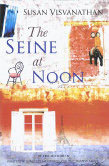Apr 19, 2024
Apr 19, 2024
All Stefan cared was to be "in this city where the light was like no other and space and time spread themselves enchantingly and generously like a woman who loved without measure. Paris was no predatory animal, Paris had no tentacles, no claws, no fetid odor". Boatman Jacques empathizes with the conjugal tug between Stefan and Esther, a love the author fleshes out with great tenderness and exquisite detail. His own wife, a childhood sweetheart, had cut loose from him to chase the world of elusive art.
Much of the plotlessness of life gains a poetic nuance as author Susan Visvanathan flows with the tide in her new novella "The Seine At Noon".
The river forms the Parisian spine as Stefan, the son of immigrant Jews from Kerala, and Frenchman Jacques find each other even as their women abandon them in their own ways - by death from old age or devotion to the genius of Salvador Dali. The city and its spirit, embodied by the silent Seine, weave away from the old stereotypes into a delicate skein of affections and inheritances.
The tone adopted is that of a lazy summer afternoon when a dog's mischief with a loaf of bread and a man buying a dress for his wife are haphazard instances of happiness. Much like the Seine, the story ambles on in wavelets of intense friendship between the two men.
The bearded and burly Stefan, the middle-aged man with a limp, loved to buy Esther baubles and jigsaws for "she was always pleased with them, having a tremendous capacity to stare into windows and want things".
Like in her other novels - "Something Barely Remembered" and "The Visiting Moon" - the author deliberates on the microcosm aspect of human ties, of the tiny lines furrowing a brow, of a wife's insane temper that evaporates in a jiffy and the simple joy of watching a beloved dog dissolve into laughs.
Despite the forced Indian links at the beginning and end of the story, there is no attempt to distract the reader from the force of a friendship with allusions to racial persecution or immigrant wrangles. Instead, a lyrical layer floats to the surface again and again to reinforce the fragility of fate and the irrelevance of dreams.
Visvanathan writes: "The life of a city was its river, and the Seine was still alive. It had not been killed or tarred over, it had not been suffocated with motor oil, it had not disappeared in a bubble of semen and soap, domesticated vilely by the turds of a seething civilization. So Parisians thought. Yet, no fish leapt, no one dared bathe, and politicians came to power because they swore they would clean the river."
The harried references she makes towards the end to the tsunami, a remote southern village, Jacques' daughter's heartbreak and marital bliss with a Malayali are somewhat removed from the tenor of the rest of the story. But notwithstanding the slightly rambling nature of the work, Viswanathan has managed to tell a sparkling story that's almost aquatic in its depiction of the imbalances in human preoccupations.
19-Sep-2007
More by : Shinie Antony